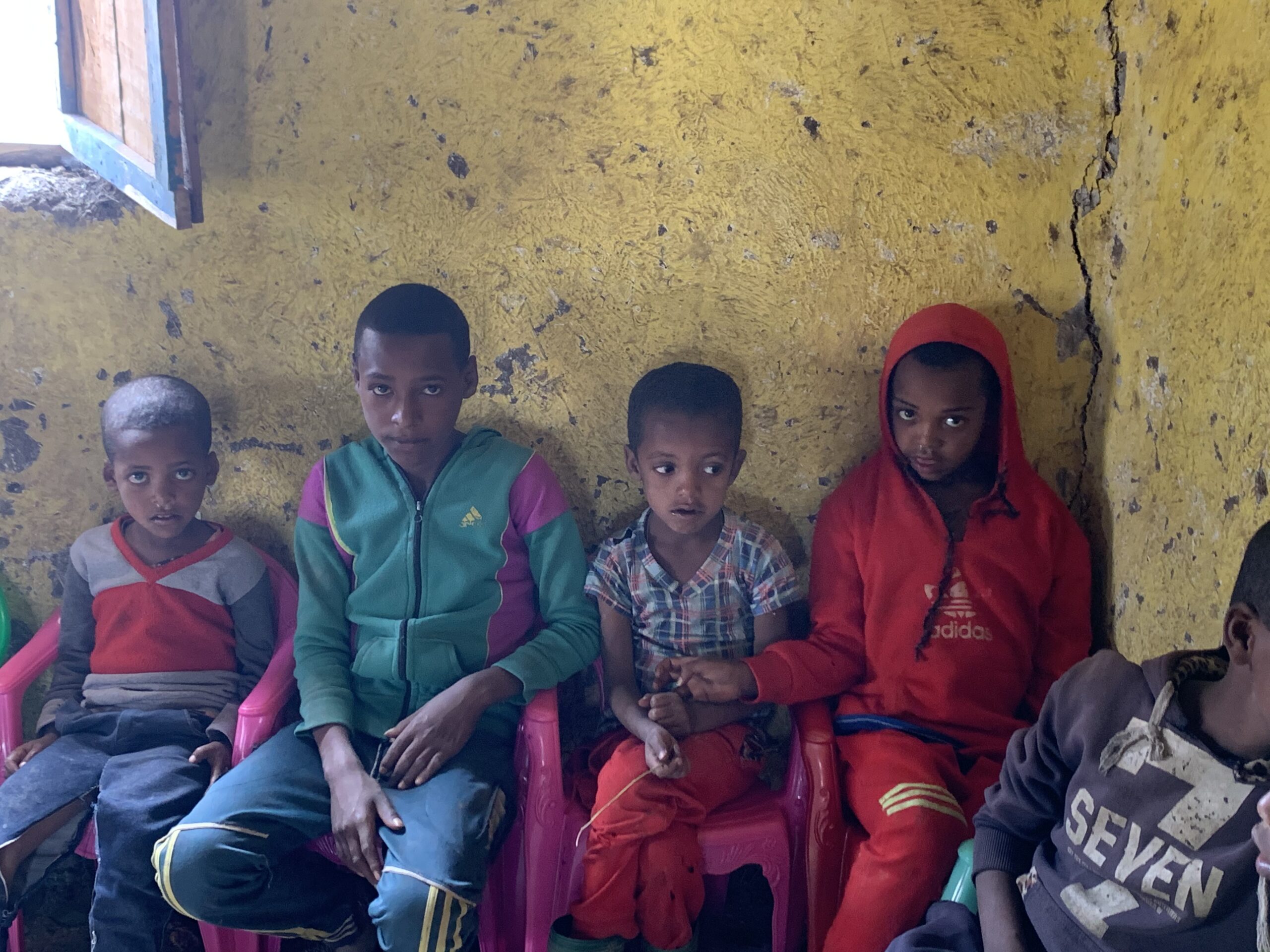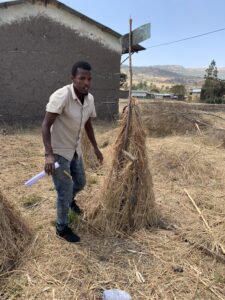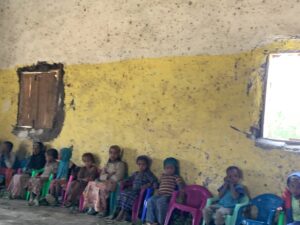Policy support for government-led Home Grown School Food initiatives

School feeding programmes that not only advance education, health and nutrition outcomes of school children but benefit local smallholder farmer production through inclusive and sustainable procurement practices.
Key words: Sustainable, public food procurement, school meals, local, small-scale farmers
Short description
Name of the initiative? Policy support for government-led Home Grown School Food initiatives
Country Ethiopia & Senegal
Region Countrywide
What kind of initiative Farming/production, processing, marketing, policy-making
The Story
School feeding programmes are one of the main social protection programmes involving food distribution, reaching millions of children in the world daily. In the last decade, Governments have been increasingly investing in Home-grown school feeding programmes (HGSF) to promote diversified school menus for better nutrition and to use its public demand for food to support farmers and small-scale value chain actors in gaining access to a predictable and stable local market. Linking schools with the production of small-scale farmers requires a set of policies and adaptation, so that small-scale farmers are prioritised and can sell their products without barriers. To have success, programmes may need to arrange for additional support to farmers, so that they can increase their productivity to match the demand. With the support of the Government of Italy, our aim is to support countries on the use of HGSF as a catalyst to boost local agriculture, strengthen local food systems and move people out of poverty. The project will enhance the technical capacity of Senegal and Ethiopia’s governments operate their current HGSF initiatives and provide additional options for decision making on supply chain and business models, operational modalities, and adapted procurement regulatory frameworks and contractual options for inclusive and sustainable public procurement of a diversified food basket.
“…our aim is to support countries on the use of HGSF as a catalyst to boost local agriculture, strengthen local food systems and move people out of poverty.”
FAO started supporting HGSF in 2012. The project is in line with various international and regional policy frameworks that recognise the potential public food procurement initiatives have in addressing social economic, and environmental goals, the use of school feeding as a means to achieve food security, nutrition and education improvement for school children, and also foster agriculture development.
In Africa, HGSF is embedded in Pillar III of the NEPAD CAADP, which focuses on ending hunger and malnutrition, stimulating local production and investing in human capital. As a regional operationalisation framework for SDG 4, the African Union adopted the Continental Education Strategy for Africa 2016-2025 (CESA 16-25) to ‘ensure inclusive and equitable quality education and promote lifelong learning opportunities for all’, as a key policy tool for AU’s Agenda 2063 aimed at fostering the skills, human capital, and education revolution in Africa. During the first CESA 16-25 planning meeting, School Feeding was raised as a strategic area of intervention to improve performance of education systems in Member States, and meet the goal of Agenda 2063.
 Designing and implementing a HGSF programme is a complex task, involving several public institutions, ministries and agencies at different levels, as well as private sector actors. HGSF can be designed on the basis of different operational models, with different emphasis. As more national governments initiate and scale up investments in HGSF programmes, global partners are being asked to support those efforts with tools, technical and financial assistance and/or other resources for delivering effective, efficient HGSF programmes.
Designing and implementing a HGSF programme is a complex task, involving several public institutions, ministries and agencies at different levels, as well as private sector actors. HGSF can be designed on the basis of different operational models, with different emphasis. As more national governments initiate and scale up investments in HGSF programmes, global partners are being asked to support those efforts with tools, technical and financial assistance and/or other resources for delivering effective, efficient HGSF programmes.
FAO supports governments and development partners to design the right policies, programmes and legal frameworks that promote food security and nutrition. We advocate for the implementation of these policies and programmes, encouraging sufficient financial resources to be made available, the right organisational structures to be in place, and importantly, ensuring adequate human capacities.
Main actors include: institutions at central and regional/local level, including Ministries of Education, Agriculture, Health; Public Procurement Authorities; School Committees; Producer Organisations supplying HGSF, i.e. Peasant organisations in Senegal, Primary cooperatives and secondary cooperative unions in Ethiopia, national universities, national bodies involved in public market regulation (Agence de regulation des marches publics in Senegal), international research institutions (for the impact evaluation of HGSF programmes at the supply side), international companies for field surveys
FAO has globally recognised technical expertise in food systems, can act as a neutral broker (represented by almost all UN Member nations) and has a global capillary presence to capitalise on and share knowledge and experiences across countries and regions. This gives us a comparative advantage in supporting countries and development partners to make food systems more nutrition and health focused.
FAO presents a global mandate and technical and operational capacity on both the supply and demand sides of procurement, being capable of supporting production and availability of food of high quality and nutritional value and promoting healthy eating habits through knowledge generation and dissemination, capacity building and nutrition education. We have a long-standing technical work and policy dialogue on governments’ participation in food markets, and are building upon it in order to support the growing interest on inclusive public food procurement adopting set-aside or preferential regulatory instruments. FAO has the global mandate and technical expertise to produce global public goods such as the methodologies or standards for producing national statistics.
“The main challenge of the initiative is the multi-sectoral and multi-scale nature of HGSF programmes…”
The main challenge of the initiative is the multi-sectoral and multi-scale nature of HGSF programmes, which makes the support to improve their efficiency challenging.
The continental policy framework set up by African Union provides a unique opportunity for Member Countries to streamline their ongoing HGSF programmes and/or to set up new ones. However, this requires coordination mechanisms, human resources and public financial investment.
The initiative was able to mobilise the already existing interest of national institutions in fully supporting and upscaling HGSF programmes. The production of normative products and of studies conducted at national level (like the legal and regulatory public food procurement framework assessments for Ethiopia and Senegal) provided the basis for a sound advice to national institutions to improve efficiency of HGSF programmes to ensure inclusive local procurement models of a diversified food basket for school menus.
“Designing and implementing a HGSF programme is a complex task…”
Designing and implementing a HGSF programme is a complex task, which involves several public institutions, ministries and agencies at different levels, as well as private sector actors. HGSF can be designed on the basis of different operational models, with different emphases. As more national governments initiate and scale up investments in HGSF programmes, global partners are being asked to support those efforts with tools, technical and financial assistance and/or other resources for delivering effective, efficient and effective HGSF programmes.
 The set up of coordination mechanisms facilitated by the project has contributed to improve HGSF operations for the benefit of both school children, who have improved access to a food-based diversified menu, and for local small-scale producers, who have more opportunities to access HGSF market.
The set up of coordination mechanisms facilitated by the project has contributed to improve HGSF operations for the benefit of both school children, who have improved access to a food-based diversified menu, and for local small-scale producers, who have more opportunities to access HGSF market.
Building on the support provided by WFP, the project managed to raise awareness in target countries on the need to amend and adapt the regulatory framework related to PFP for HGSF to enable small-scale producers organised into cooperatives and associations to access HGSF market.
The need to tackle school menu diversification to include locally produced food items (e.g. fresh products) can be considered as one of the additional lessons learned from the project, since so far school menus have been based in most cases on global guidelines not taking into consideration locally produced alternative products on a scientific basis.
“The need to tackle school menu diversification to include locally produced food items (e.g. fresh products) can be considered as one of the additional lessons learned of the project…”
The community is benefiting from nutritious diversified school menus, both for school children and for the benefit of local suppliers, who have improved their source of income by accessing a relatively predictable market.
Governments have increased engagement in understanding the multi-sectoral and multi-level nature of HGSF programmes to improve the linkage between social protection and agriculture development. This included also the need to adapt existing regulations to enable local small-scale suppliers to access HGSF market outlets.
Additional information
A literature review on public food procurement was published in December 2018:
http://www.fao.org/3/ca2058en/CA2058EN.pdf
– The best practices outlined were summarised and published as a one pager in December/2018:
http://www.ipc-undp.org/pub/eng/OP411_Public_food_procurement_from_smallholder_farmers.pdf
– A summary of the regulatory framework guidelines was published in December 2018
http://www.ipc-undp.org/pub/eng/OP412_Public_food_procurement_and_the_support_of_smallholder_farming_the_importance_of_a_conducive_regulatory_framework.pdf
– Legal PFP assessment for Ethiopia:
– Legal PFP assessment for Senegal
– Normative products:
http://www.fao.org/3/ca0957en/CA0957EN.pdf
http://www.fao.org/3/a-i7636e.pdf
http://www.fao.org/3/a-i7441e.pdf
—
Repository compiled in April 2020 by: Cristina Scarpocchi
E-mail contact: cristina.scarpocchi@fao.org
